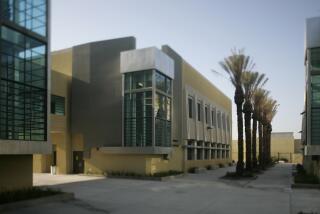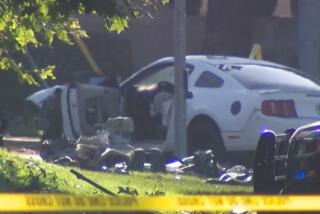Teenage Athlete Died of Heart Condition, Autopsy Indicates
- Share via
UPLAND — A 15-year-old boy who collapsed during an outdoor workout at Upland High School on Monday died as a result of a heart condition, according to a preliminary autopsy conducted Tuesday by the San Bernardino County coroner’s office.
“There’s no evidence at this point that the heat had any effect on him,” said coroner’s spokesman Randy Emon. Additional toxicology studies are pending, he said.
Christopher J. Hertzog collapsed about 4 p.m. Monday as a 30-minute workout neared completion. At the time, Hertzog had just taken a water break and was participating in a series of six 40-yard stretching sprints, called “striders,” said the school’s athletic director, Jim Drake.
Hertzog was among about 40 athletes participating in a physical conditioning class to prepare them for fall sports, officials said. The youngsters were dressed in shorts and T-shirts. Hertzog, who weighed 207 pounds and was 5-foot-10, hoped to play as a lineman on the school’s junior varsity football team.
The high temperature in Upland on Monday was 103 degrees.
Paul Watson, superintendent of the Upland Unified School District, said coaches cut Monday’s workout short because of the heat. But despite what he called a tragic death, “there will not be any major modifications to our procedures.”
On Monday, he said, the boys were only asked to run six sprints instead of the usual 15.
“In all unusual weather situations . . . the staff reviews the conditions and determines the appropriate activities,” Watson said. “The staff will make modifications if it is extremely hot.”
He said students are free to break away at any time to drink water, and that the athletes donned T-shirts drenched in water before they began their exercises.
The California Interscholastic Federation, which governs high school athletics, leaves decisions to local schools about practice policies in hot weather, said Bill Clark, assistant commissioner for the federation’s southern section.
“Once we know what happened, we will definitely look into ways of heightening awareness so that it never happens again--if it is preventable,” Clark said.
More to Read
Sign up for Essential California
The most important California stories and recommendations in your inbox every morning.
You may occasionally receive promotional content from the Los Angeles Times.













